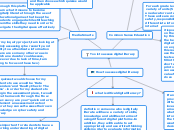If an educator desired, they could provide students with samples of different websites. Through investigation, the students could look around the sites in order to determine whether the source is credible and the information valid - this would provide the teacher with assessment on weather students can effectively decode information
The educator in collaboration with students could keep a list of reputable and credible sites. The students could then reference these websites when doing further inquiry on the internet or other digital platforms - this would be a classroom application that students could use in a real world context
How to assess digital literacy
it is important for students to have a working understanding of digital literacy because students are exposed to a vast array of digital media and are expected to navigate these platforms
Students also need to understand how to use digital platforms in a safe manner. They need to know things such as keeping personal information offline and avoiding talking to people you do not know
In my opinion, students of a young age should be taught as soon as possible how to differentiate between a credible and false source on the internet. This will avoid allowing students to fall prey to false information within different media
Tools to assess digital literacy
Common Sense Education
it is possible to asses students based on the pre-made questions provided by this website however, I feel that the best way to have students gain digital literacy skills to to have hands-on experience using technology - for this reason, I would like students to use the online tests available: these tests are comprised of multiple choice, fill in the blanks, drag and drop, and short answer. Students are able to print out their results and the teacher can use these results to assign a grade value for digital literacy if they wish to do so
For each grade level, there are a variety of units (5 lessons each) that an educator can teach their class. These units are comprised of internet safety, responsibility and ability to differentiate information of the internet
this platform provides educators with lesson plans and ideas on critical digital literacy
Media Smarts
For my inquiry project, I am looking at mainly assessing cyber security and ability to authenticate information (there are so many other areas in which an educator could assess, however due to lack of time, I am going to focus on these two)
the quizzes I would choose for my students to use would be 'Data Defenders' and 'Reality Check: The Game' - in order for my students to bring in the assessment piece, I would have them work through the 'How cyber-savvy are you?' quiz in order to implement an assessment as tool where they can self-assess their own knowledge on cyber safety and literacy
these games can lead lead into possible conversations in the classroom about issues surrounding media literacy (such as digital citizenship, bias, or cyber security) - the educator can choose what they are looking to assess the students on and then choose which quizzes would be applicable
through this platform, students can learn what it means to become digitally literate through the use of educational games that keep the students engaged while still teaching them the skills they need in order to navigate the digital space effectively
what is critical digital literacy?
definition: someone who is digitally literate will have a variety of skills, knowledge and abilities in terms of using different digital platforms. In addition, they will be able to act appropriately and use critical thinking skills in order to evaluate information effectively.
this inquiry question links critical digital literacy because it is important for students to know how to navigate platforms effectively. Since I am targeting younger students, I think that the most beneficial areas to assess are internet safety and differentiation (between credible and non credible sources) at this grade level. This inquiry question falls under the evaluating information effectively aspect of the definition above. In addition, it links to critical thinking because it is important for students to be able to decode information so they do not acquire false information. They need to be able to look deeper that what they see online and decide for themselves whether they can trust the information or not.

